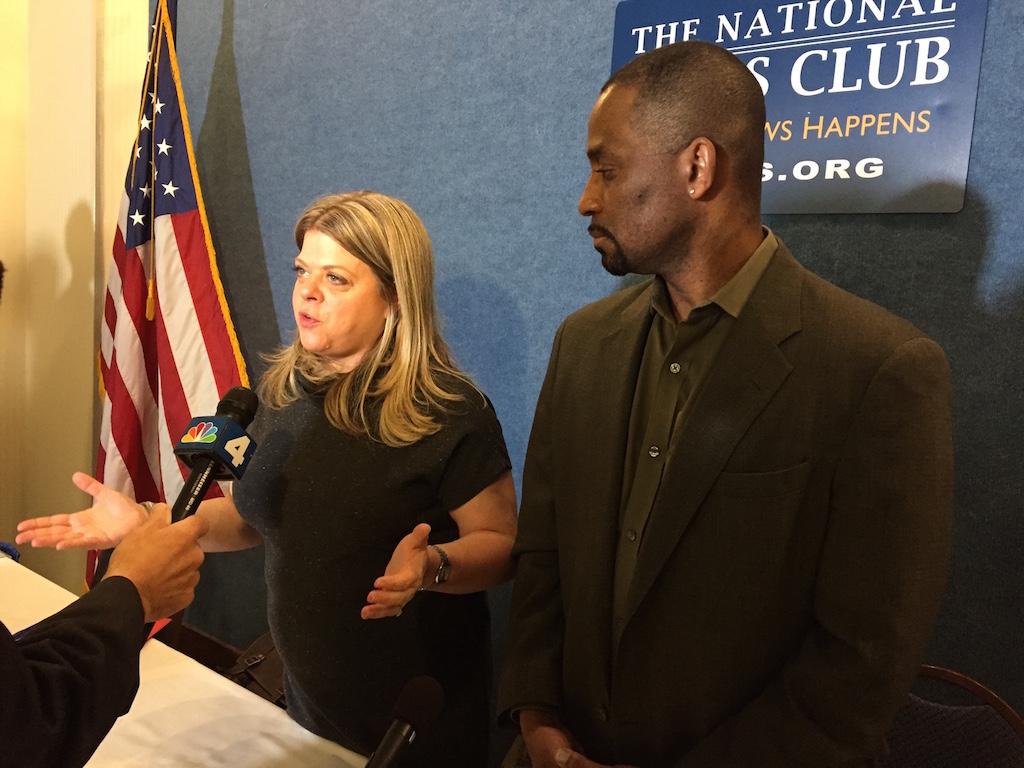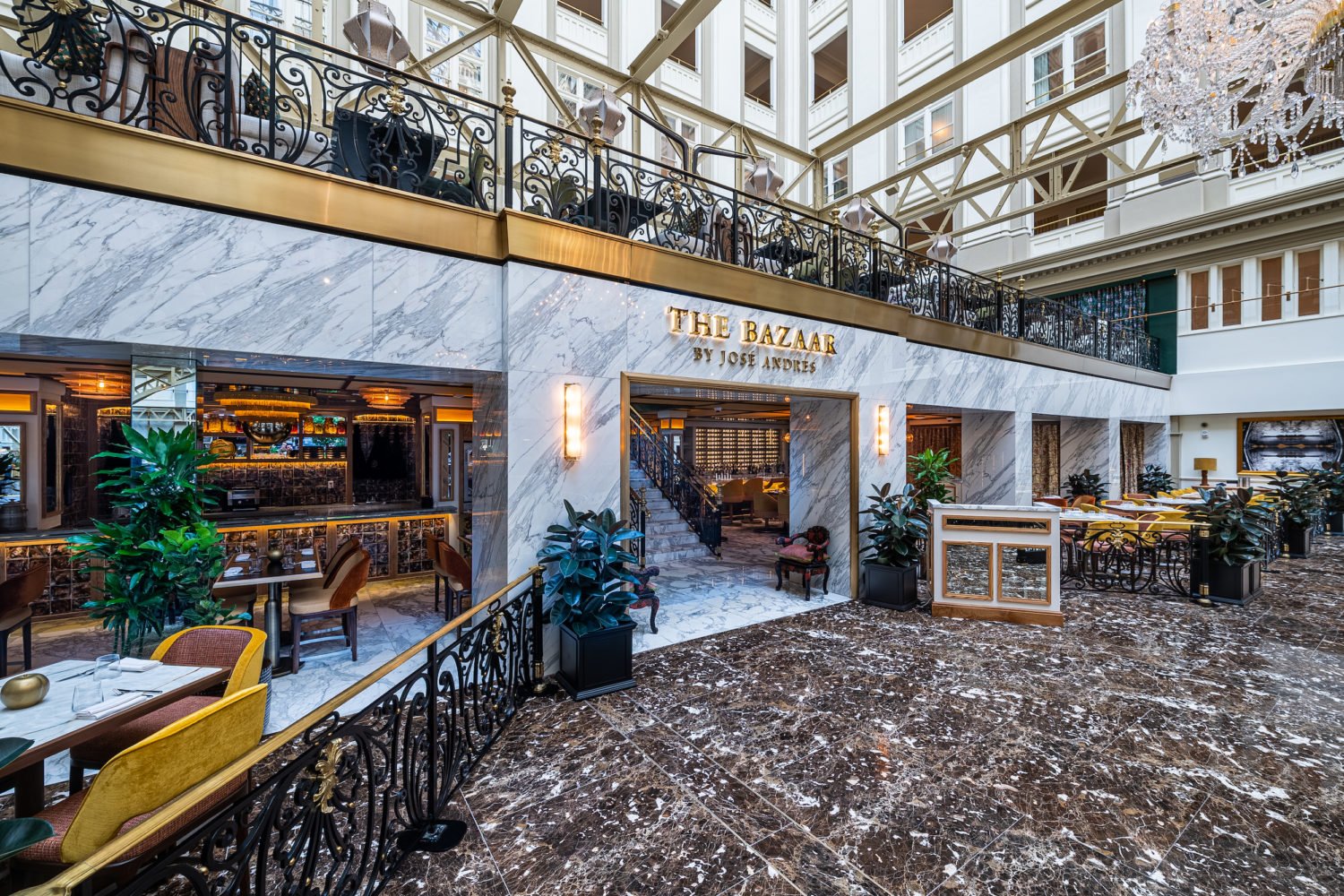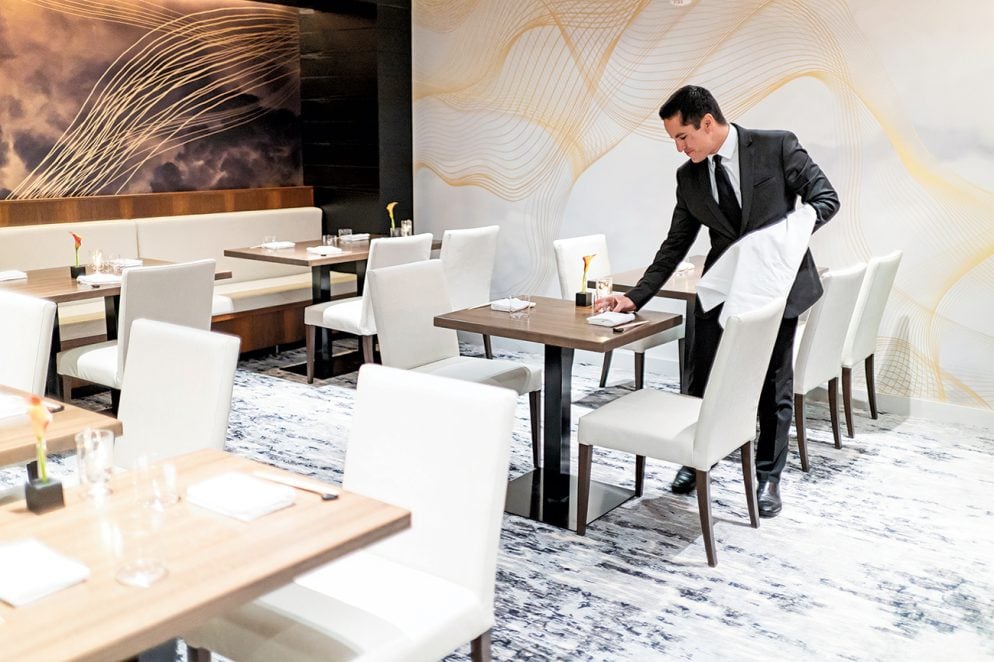Khalid Pitts didn’t tell his mom before he sued the President of the United States.
But then there he was, with his wife and co-owner of Cork Wine Bar Diane Gross, in front of a cramped room full of reporters and cameras at the National Press Club on a Thursday morning in March. MSNBC was airing them live, and the broadcast happened to flicker in the background of his mother’s Detroit home. As Pitts, Gross, and their three pro-bono lawyers explained how Donald Trump’s continued affiliation with his DC hotel put competing businesses at a disadvantage, the restaurateur’s phone started buzzing with messages: Why are you on TV? Why are you suing Trump? You didn’t tell me this!
“She’s a very protective mother,” Pitts says. “Yes, I got yelled at by my mom. I’m still getting yelled at by my mom.”
When the restaurant opened for dinner later that evening, the phone started ringing non-stop with different kinds of calls. These ones were filled with expletives. You suck. Your business is going to fail. You’re awful people. Pitts and Gross, along with a manager, took over most of the phone duties to shield the hostess from having people scream in her ear. They responded with “thank you for your call” and hung up.
This is what happens when you sue the president.
Pitts and Gross started considering the lawsuit not long after Trump’s inauguration. Initially, Gross had been chatting to the restaurant’s longtime attorney about immigration issues around the time of the immigration ban, and the conversation spiraled into Trump’s potential conflicts of interest with the hotel. They felt that they were unfairly losing business from lobbyists, government officials, and others who felt pressure to instead spend money at the Trump hotel in order to curry favor with the new president.
“[Our lawyers] were talking about this, and we were talking about it, and to bring a suit that was viable, they needed a good plaintiff,” Gross says. “They needed a restaurant that had international business and members of Congress and was a destination dining spot that had catered to those types of people.”
Gross and Pitts were immediately interested in the unfair competition lawsuit, but took another month or so to make a final decision. Gross, who’s a lawyer herself, read the complaint, which listed Trump personally and the Trump International Hotel as defendants. They also talked to a very small group of management staff, friends, investors, and family about the potential up- and downsides.
Safety for family and staff was the first concern. “It just takes one nutcase,” Pitts says. And given their backgrounds in politics, they weren’t naive about how ugly things could get. Gross was counsel to former US Senator Barbara Mikulski, and Pitts was a campaign director for Service Employees International Union and political director at the Sierra Club.
At the advice of friends in politics, they did their best to minimize the personal information they had online leading up to the lawsuit. Pitts had run for DC Council in 2014, which meant his home address was on a lot of public paperwork. “There are people who could know where we’re living, and so we thought about that,” he says.
The couple also had photos of their kids from a gingerbread house contest on the walls of Cork Market & Tasting Room. All of those were removed. Any reference to their family or personal information about staff was also scrubbed. That wasn’t alway easy task: “Our restaurant is us and our market is us, so we brought our personal lives to some degree in here,” Pitts says.
When the lawsuit was announced on March 9, Pitts and Gross knew there would be interest, but they didn’t expect as much national press as they received. Almost immediately, the Trump organization called it “a wild publicity stunt completely lacking in legal merit.” More recently, Trump’s lawyers filed a motion to dismiss the case.
It took around 24 hours for Cork Wine Bar’s Yelp page to become completely unusable. People from Jacksonville to Dallas who’d clearly never been to the restaurant tried to sink its online rating with made-up complaints about rats and rude service. After some prodding, Yelp put an “Active Cleanup Alert” on the page.
Meanwhile, on Twitter, one user told Pitts to go back to his country. “Did Canada annex Michigan?” Pitts says. In general, he’s tried to keep a sense of humor about the whole thing. The backlash inspired him to start his own version of Jimmy Kimmel‘s “Celebrities Read Mean Tweets” segment. He retweeted some of the insults with the hashtag #CorkMeanTweets.
“I’m not going to let people think that we’re going to be intimidated by this,” Pitts says. “I’m trying to de-escalate in a way.”
There’ve been a handful of more serious threats, too, although the restaurateurs didn’t want to elaborate. Pitts and Gross have been in touch with the DC police and the FBI about them—just in case.
They’ve also conferred with Comet Ping Pong owner James Alefantis, who’s been the victim of a bizarre conspiracy theory that led to a gunman showing up at his restaurant. There could be a club for restaurants that have become political targets.

But for all the screaming phone calls and mean tweets, Cork has been flooded by positive messages as well. Within a week of filing the suit, the first postcard arrived. At first, Gross thought it was a thank you from the company the buy cards from. Instead, it was a postcard from someone thanking them for their lawsuit. Over the next couple weeks, the thank you postcards started coming in three or four a day—from Florida, Oregon, Iowa, New York, and beyond. Overall, they’ve collected several dozen.
“Thank you for standing up to the corruption of the new administration,” one reads.
“Good luck with the lawsuit. It appears to be another way Trump is reaping from his office,” says another.
One letter from Florida included a family portrait—and a $20 bill. “This one I have to send back,” Gross says.
Customers have also come in to the restaurant just to thank them. One group of women drove down from Philadelphia for brunch to show their support.
The attention has since died down with the occasional flare-up every time they’re mentioned in the news. Overall, Pitts and Gross haven’t seen any major change in sales since the lawsuit. “Business is pretty much the way it’s always been,” Pitts says.
Still, there’s also the question of whether the lawsuit further turned off business from the people who they say are now going to the Trump hotel instead.
“We thought about it,” Pitts says. “But it was the right thing to do.”














